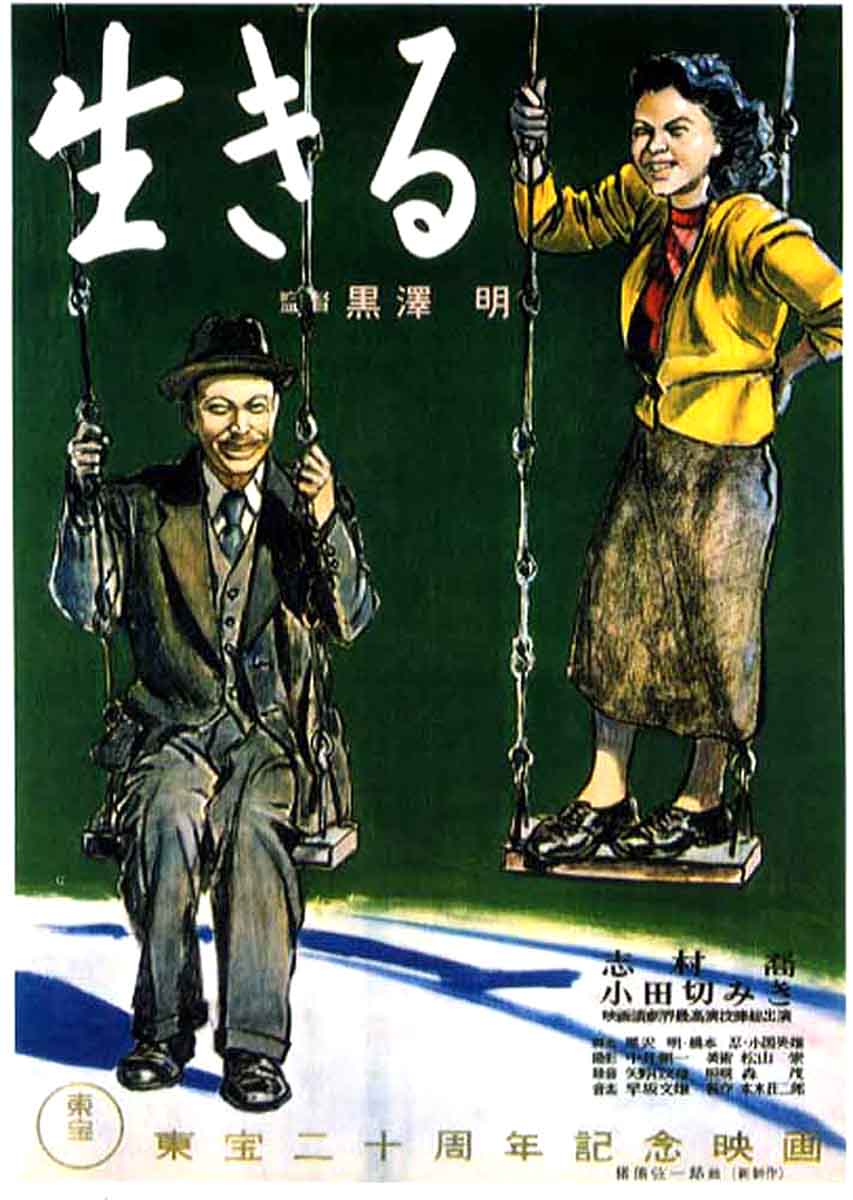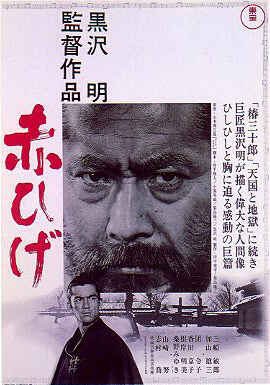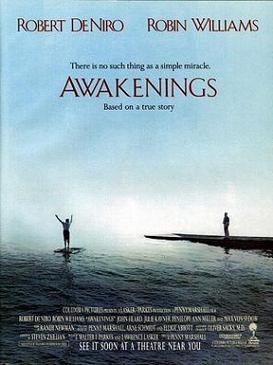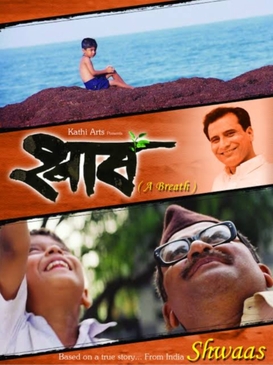
Director: Akira Kurosawa (1952, Japanese, 143 mins)
Reviews: RottenTomatoes (100%), IMDB (8.4), Wikipedia, Amazon, Roger Ebert.
Watch online: Hulu.
Similar movies: city life, death, illness, old age.
Summary: Fabulous movie. One of my all time favorites. The story revolves around Watanabe, a city bureaucrat who has lived a purposeless, listless life for over three decades, pushing paper around. Suddenly, he discovers that he has stomach cancer, so he has about six months to live. He is rattled. He doesn't know what to do. Drink? Spend time with women? Relive his youth? What will give him peace of mind? Is 'khao, piyo, aish karo' the right approach? Or is Leo Tolstoy's short story 'The Three Questions' the right approach? As the movie progresses, Watanabe discovers his answers and comes alive :) Cinematography, acting, story development, the theme - everything is superb.
The structure of the movie is quite unique. There are two distinct parts. In the first part, time moves forward chronologically. In this part, Watanabe discovers that he has stomach cancer and looks for answers. The last scene in the first part is in a restaurant where Watanabe has an intense and honest discussion with a younger female friend on what he should do! He suddenly hits upon an idea. Within seconds of his aha! moment, he starts alighting a staircase while a 'Happy Birthday' song plays in the background.
When the second part of the movie starts, Watanabe has died and people have come to pay their respects. It is at this point that people put together Watanabe's story, discussing how he changed in the last few months of his life. This is a long scene with many flashbacks.

Director: Hrishikesh Mukherjee (1975, Hindi, 150 mins)
Reviews: RottenTomatoes (85%), IMDB (7.6), Wikipedia, Amazon.
Watch online: YouTube, YouTube.
Similar movies: illness, romance.
Summary: Yet to write.

Director: Ritwik Ghatak (1960, Bengali, 126 mins)
Reviews: RottenTomatoes (N/A), IMDB (8.1), Wikipedia, Amazon.
Watch online: YouTube.
Similar movies: depressing, family, illness, intense, village life.
Summary: Haunting and tragic. Very well made. Character development and story telling were both wonderful. I felt that each role was played to perfection and there were no extra characters.
This is the first movie by Ritwik Ghatak that I saw and I really liked it. Recommended if you're in a mood to watch a serious, sombre, tragedy.

Director: Akira Kurosawa (1965, Japanese, 185 mins)
Reviews: RottenTomatoes (75%), IMDB (8.2), Wikipedia, Amazon, Roger Ebert.
Similar movies: illness.
Summary: Yet to write.

Director: Lasse Hallström (1985, Swedish, 101 mins)
Reviews: RottenTomatoes (100%), IMDB (7.7), Wikipedia, Amazon.
Similar movies: childhood, death, family, illness, intense.
Summary: A beautiful movie! A 12-year old boy named Ingemar is the main character. He is faced with his mother's illness, puberty, relocation to another town and separation from his dog, all at once. In the midst of turbulence, a panorama of joyful, sorrowful and comic moments unfolds in Ingemar's life. Lasse Hallström has handled the storyline well. The movie is delicate, touching and authentic.
Character development is pretty good. Other than the main characters, there are queer townsfolk which add spice. Landscape shots of Swedish homes in snow are gorgeous. The movie won the Golden Globe Award for the Best Foreign Film in 1987.
An ongoing thread in the movie is innocent exploration of sexuality at young age. The scenes in the movie may surprise Indian audiences who have to realize that sexuality is handled very differently in Sweden. For example, an effective sex education program is in place since 1956. Kids who grow up in USA and relocate to Sweden are shocked when they attend these classes. At the same time, they find them rewarding because Sweden's program is more in touch with reality than the equivalent US program. Straight Facts about the Birds and Bees in US News, 2007. RFSU is the organization behind Sweden's sex education programs.

Director: Mani Ratnam (1989, Telugu, 142 mins)
Reviews: RottenTomatoes (N/A), IMDB (7.7), Wikipedia.
Watch online: YouTube.
Similar movies: death, illness, romance.
Summary: A romantic movie that touches upon the theme of death. The storyline reminded me of a Buddhist tale:
A woman anxiously told a monk, "My doctor has given me only a few months to live. Can you help me? I am dying." To her surprise, the monk began to chuckle. Then he said quietly, "You see, we are all dying. It’s only a matter of time. Some of us just die sooner than others."
The movie is entertaining. Like a Hindi masala movie. Acting by the lead actress (Girija Shettar) is pretty good. Songs by S P Balasubramaniam and Chitra are "wow"!
An awesome song in the movie is Om Namaha by S P Balsubramaniam and Chitra. It sounds like a Sanskrit prayer but it is actually a romantic song filmed around the two protagonists absorbed in a three minute long kiss. Translation of Om Namaha. Lyrics are by Veturi, Gulzar of Telugu Cinema.

Director: Penny Marshall (1990, English, 121 mins)
Reviews: RottenTomatoes (87%), IMDB (7.7), Wikipedia, Amazon, Roger Ebert.
Similar movies: illness, true story.
Summary: Awakenings is a touching, true story in the life of Dr Oliver Sacks. A good movie to help us understand the limitations of cutting edge medical treatments. In 1969, Dr Sacks tried a drug called L Dopa on patients suffering from catatonia, a state of stupor whereby a patient is frozen in time performing some action; the patient is alive but asleep. Some of his patients woke up after 25 years. Their joy is captured quite well in the movie. The movie is based on the book Awakenings (464 pages, 1999) by Dr Sacks.
Nominated for three Oscars, didn't win any. Great performances by Robert DeNiro (the patient) and Robin Williams (the doctor). A good review by Roger Ebert: here An article that explains that the movie is remarkably close to the actual story: here.
Who is Dr Oliver Sacks? He is a famous neurologist who has written books like The Man Who Mistook His Wife For A Hat (1985), Musicophilia (2007) and Migraine (1970).

Director: Lasse Hallström (1993, English, 118 mins)
Reviews: RottenTomatoes (89%), IMDB (7.7), Wikipedia, Amazon, Roger Ebert.
Watch online: NetFlix.
Similar movies: family, illness.
Summary: An awesome movie showcasing a dysfunctional family in a small town. What holds the family together is love. The main character, Gilbert, assumes a lot of responsibility. He has a morbidly obese mom who never ventures out of home, a mentally challenged younger brother and two sisters in the family. He is commited to taking care of everybody in his family, especially his younger brother Arnie, and his mom.
Acting by Johnny Depp (as Gilbert Grape), Leonardo DiCaprio (as Arnie Grape) and Darlene Cates (as mom) is awesome.

Director: Rajkumar Hirani (2003, Hindi, 156 mins)
Reviews: RottenTomatoes (N/A), IMDB (8.5), Wikipedia, Amazon.
Similar movies: comedy, illness.
Summary: Yet to write.

Director: Sandeep Sawant (2004, Marathi, 107 mins)
Reviews: RottenTomatoes (40%), IMDB (7.7), Wikipedia, Amazon.
Watch online: YouTube, YouTube.
Similar movies: childhood, depressing, illness.
Summary: Yet to write.

Director: Mick Jackson (2010, English, 107 mins)
Reviews: RottenTomatoes (100%), IMDB (8.3), Wikipedia, Amazon.
Similar movies: biopic, illness, true story.
Summary: A touching and inspiring true life story of an autistic woman named Temple Grandin who overcame a series of challenges to become a Professor in Colorado State University. Temple had an aptitude for science. She did a Ph.D. in Animal Husbandry, designing cattle ranch systems for humane treatment of animals which also improved profitability. By the time I'd finished watching the movie, I had been moved to tears a few times. I also felt humbled and inspired. Acting is superb.
1. The movie shows three aspects of Temple's autism really well: how her mind is different from others, the challenges she faces in social interactions and techniques she uses to soothe herself when she's stressed. She invented the 'hug machine' or 'squeeze box' at age eighteen, which is now popular among autistic kids who do not like to be touched by people. Many scenes show how Temple processes visual and audio input: as a series of inter-connected pictures, whose details remain in her mind forever. These abilities enable her understand how animals process information, helping her design cattle ranch equipment and processes.
2. The movie does not make Temple look more human-like than she really is. Sci-fi and anime movies imbue everybody from animals, plants, vehicles, bots and aliens with human like feelings and sensitivity. Temple Grandin remains Temple Grandin throughout the movie. She is unable to connect emotionally to people. That is how she always has been.
3. The movie shows Temple's doggedness in pursuing projects in the real world. She will not take 'no' for an answer, despite her social awkwardness. A memorable quote from the movie, which Temple uses many times to overcome hurdles: “Think of something as a door, a door that is going to open up onto a whole new world for you. And all you need to do is decide to go through it.” Temple applies this mantra multiple times. The movie is worth watching for these scenes alone!
Temple also gave a TED talk: The World Needs All Kinds of Minds.

Director: Joe Cross (2010, English, 97 mins)
Reviews: RottenTomatoes (67%), IMDB (7.7), Wikipedia, Amazon.
Watch online: Hulu.
Similar movies: documentary, food, illness.
Summary: The documentary narrates the personal story of an Australian businessman named Joe Cross. Joe has been plagued by an autoimmune disorder for over nine years. He comes in touch with Dr Joel Fuhrman who encourages him to do a juice fast for 60 days. Dr Fuhrman is a prominent advocate of Plant Based Diets. He has also written Fasting and Eating for Health, a book on fasting.
Joe Cross comes to USA. For 60 days, he drives from coast to coast in a Mercedes Convertible. He buys a juice machine and consumes only juice for 60 days. Every day, he makes videos of himself and others that he meets at restaurants and on streets. He asks people questions like "Do you believe that you eat healthy?", "What changes would you like to make?" and "Why do you not make changes?" The responses to these questions are insightful.
By the thirtieth day, Joe meets a truck driver who has exactly the same diagnosis as him! A brief meeting with the truck driver is not sufficient to convince him to try his juice diet.
After 60 days, Joe is back in Australia, running business as usual. He looks much fitter and happier. He is cured.
After a couple of months, Joe receives a call from the truck driver who now seeks his help. Out of compassion, Joe makes time for him, revisits USA to help the driver get started with his juice fast. Both juice fasts in the movie were done with medical supervision.
The journey of the truck driver is also very interesting. Day after day, his weight drops and his happiness level increases. Soon, he becomes an inspiration to many of his community members.
What is great about the movie is that nobody is acting! Everybody is authentic, with honest answers. I found the movie very uplifting. It showcases the journey of two individuals with tremendous discipline in transforming their diet and lifestyle.
Joe Cross opened a website for others to try juice fasting: Rebooting with Joe.
Fat, Sick and Nearly Dead played an important role in my life. Soon after the movie, I did a 10-day juice fast. My experiences are narrated here: Juice Fasting for Calmness and Clarity.

Director: Lisa Cohen (2013, English, 85 mins)
Reviews: RottenTomatoes (N/A), IMDB (7.0), Amazon.
Watch online: Hulu.
Similar movies: death, documentary, illness, intense, old age.
Summary: A beautiful documentary, emotional and insightful. Prisoners in a maximum security prison in USA volunteer to become hospice workers. They take care of other prisoners who are dying. Everybody is authentic. Nobody is acting. Highly recommended. Amazon reviews are helpful in understanding what feelings the movie evokes. The title of the movie has double meaning: the prisoners are "serving life".

Director: Julian Schnabel (2007, French, 112 mins)
Reviews: RottenTomatoes (93%), IMDB (8.1), Wikipedia, Amazon, Roger Ebert.
Similar movies: biopic, illness, true story.
Summary: An artistic, sentimental movie that won a bunch of awards at various film festivals. The movie is a true life story of Elle editor-in-chief Jean-Dominique Bauby who suffered a stroke at age 43. He woke up 20 days later, only to discover that he was facing a condition called the 'locked in syndrome'. Jean-Do's mind was fully functional but he could not move his body except his left eyelid. A speech therapist devised a system of communication. She would speak French letters in decreasing order of frequency. The corresponding English letters are E, T, A, O, N, S, H, R, D, L, ... Jean-Do would blink an eye when the correct letter was spoken. Through this communication technique, Jean-Do dictated a 131-page book titled The Diving Bell and The Butterfly: A Memoir of Life in Death (131 pages, 1998). Remarkable! Isn't it?
Jean-Do's book is a first person narrative. So is the movie. Many scenes are shot from Jean-Do's perspective, limited to his field of vision and punctuated by eye blinks. In his book, Jean-Do describes three things: his real life experiences as a quadriplegic, his memories and his imagination. After his stroke, Jean-Do's real life experiences are with people who keep in touch with him: his doctors, his hard-working therapists, his wife, his kids, his aged dad, a former lover and some colleagues. They all love him. Some pray for his well being. His memories are about his life as a high flying editor of Elle (a fashion magazine), his family and his former lovers. Jean-Do's imagination reflects his abstract thoughts about his inability to move his body but his ability to move his mind freely.
What does the title of the book 'The Diving Bell and The Butterfly' reflect? Jean-Do compares his body to a 'diving bell', a heavy metallic bell-like chamber sunk into oceans for exploration. He compares his mind to a butterfly that dances around joyfully, savoring beautiful experiences :)

Director: David O Russell (2012, English, 122 mins)
Reviews: RottenTomatoes (92%), IMDB (7.8), Wikipedia, Amazon.
Similar movies: comedy, illness, romance.
Summary: A fast paced, wild, romantic comedy from 2012 with eight Oscar nominations. The theme of the movie is quite serious but it's presented with so much humor! The two key protagonists are suffering from psychological problems caused by loss of their respective partners, one to death, the other to divorce. Fate brings them together and a delicate romance develops between them. Superb dialogues, many of which are insightful.

